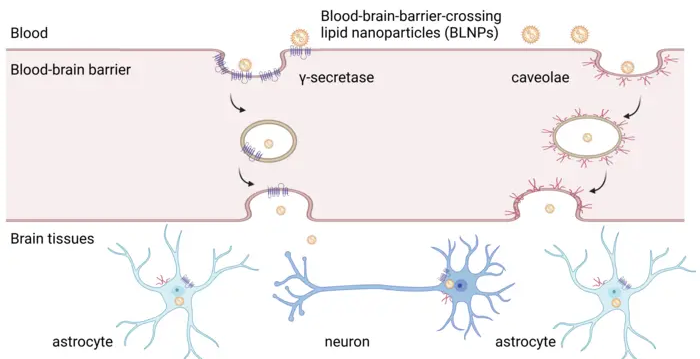Reviewed by Lexie CornerFeb 18 2025
Researchers at the Icahn School of Medicine at Mount Sinai have developed a lipid nanoparticle system capable of delivering messenger RNA (mRNA) to the brain via intravenous injection, bypassing the blood-brain barrier. The study demonstrates the potential of this technology for treating conditions such as drug addiction, brain cancer, amyotrophic lateral sclerosis, and Alzheimer's disease.
 Blood–brain-barrier-crossing lipid nanoparticles (BLNPs) effectively and safely deliver mRNA to the brain via systemic administration. Image Credit: Created with BioRender.com in the lab of Yizhou Dong, PhD, at the Icahn School of Medicine at Mount Sinai.
Blood–brain-barrier-crossing lipid nanoparticles (BLNPs) effectively and safely deliver mRNA to the brain via systemic administration. Image Credit: Created with BioRender.com in the lab of Yizhou Dong, PhD, at the Icahn School of Medicine at Mount Sinai.
The blood-brain barrier restricts the passage of many substances, including therapeutic agents, into the brain. Previous research at Mount Sinai introduced a platform for delivering large biomolecules, such as proteins and oligonucleotides, into the central nervous system. This study takes a different approach by using specifically designed lipid nanoparticles to transport mRNA across the barrier.
Delivering mRNA to the brain could enable the production of therapeutic proteins by brain cells, potentially preventing or treating diseases by enhancing protective mechanisms, replacing defective proteins, or reducing harmful ones.
Our study shows that these blood-brain barrier-crossing lipid nanoparticles (BLNPs) can safely and efficiently deliver mRNA into the brain. This could open up opportunities to use mRNA-based therapies for a variety of neurological and psychiatric disorders.
Yizhou Dong, Study Co-Corresponding Author and Professor, Immunology and Immunotherapy, The Mount Sinai Hospital
Dong is a member of the Icahn Genomics Institute and the Marc and Jennifer Lipschultz Precision Immunology Institute at the Icahn School of Medicine at Mount Sinai.
To enhance the ability of lipid nanoparticles to cross the blood-brain barrier, the research team designed and tested a library of lipids. Structural and functional analyses identified a lead formulation, MK16 BLNP, which demonstrated significantly higher mRNA delivery efficiency compared to FDA-approved lipid nanoparticles.
The researchers report that this system utilizes the blood-brain barrier's endogenous transport mechanisms, including γ-secretase- and caveolae-mediated transcytosis, to facilitate nanoparticle transfer across the barrier.
The BLNP platform has shown potential for clinical application by successfully delivering therapeutic mRNAs to the brain in mouse models of disease.
Dr. Dong says, “Our lipid nanoparticle system represents an important step in the effort to develop mRNA-based treatments for central nervous system disorders. The study provides proof of concept that such an approach is viable and could be adapted for a range of diseases where gene therapy or mRNA therapeutics might play a role.”
The researchers emphasize that further studies, including FDA-compliant toxicology assessments, are necessary to evaluate long-term safety and efficacy. Future research will focus on advancing the technology toward clinical application.
Our findings highlight the potential of lipid nanoparticles in overcoming one of the major challenges in treating brain diseases. We are very excited to continue evaluating this novel platform for broader therapeutic applications.
Eric J. Nestler, Study Co-Corresponding Senior Author, The Mount Sinai Hospital
J. Nestler is the Director of The Friedman Brain Institute, Dean for Academic Affairs, and Nash Family Professor in the Nash Family Department of Neuroscience at the Icahn School of Medicine at Mount Sinai. He also serves as Chief Scientific Officer of the Mount Sinai Health System.
Co-authors of the study include Chang Wang, Yonger Xue, Tamara Markovic, Haoyuan Li, Siyu Wang, Yichen Zhong, Shi Du, Yuebao Zhang, Xucheng Hou, Yang Yu, Zhengwei Liu, Meng Tian, Diana D. Kang, Leiming Wang, Kaiyuan Guo, Dinglingge Cao, Jingyue Yan, Binbin Deng, David W. McComb, Ramon E. Parsons, Angelica M. Minier-Toribio, Leanne M. Holt, Jiayi Pan, Alice Hashemi, Brian H. Kopell, Alexander W. Charney, Eric J. Nestler, Paul C. Peng, and Yizhou Dong.
The research was supported by the National Institute of General Medical Sciences, the National Institute on Drug Abuse, and Biogen.
Journal Reference:
Wang, C., et al. (2025) Blood–brain-barrier-crossing lipid nanoparticles for mRNA delivery to the central nervous system. Nature Materials. doi.org/10.1038/s41563-024-02114-5.